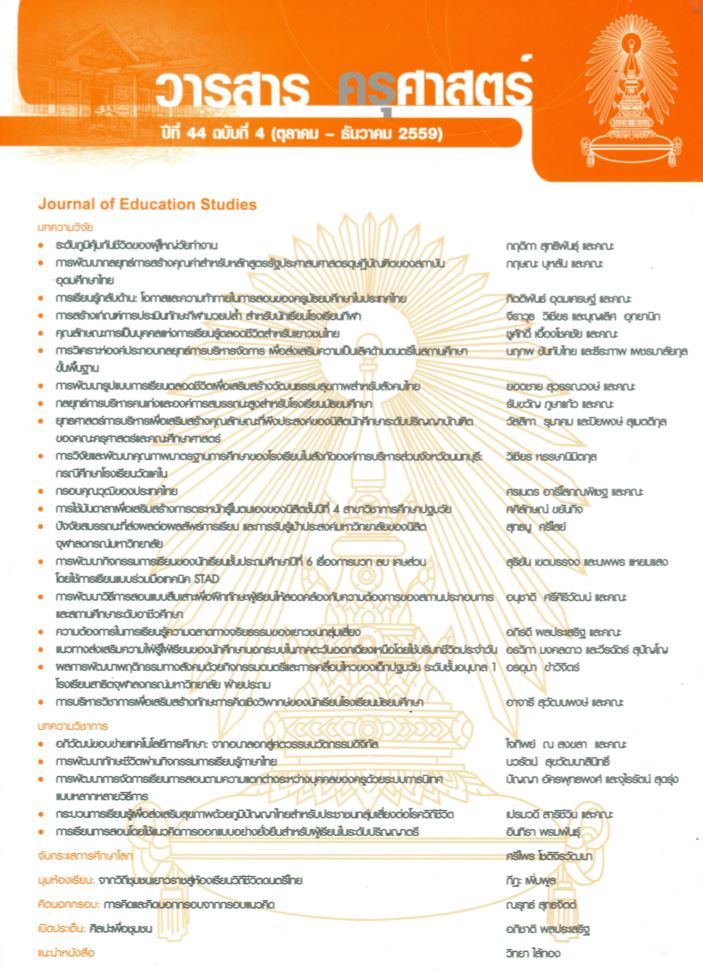การวิเคราะห์องค์ประกอบกลยุทธ์การบริหารจัดการเพื่อส่งเสริมความเป็นเลิศด้านดนตรีในสถานศึกษาขั้นพื้นฐาน
Keywords:
การวิเคราะห์องค์ประกอบ, กลยุทธ์การบริหารโรงเรียน, โรงเรียนส่งเสริมความเป็นเลิศด้านดนตรี, Factor Analysis, School Management Strategies, Musical Excellence SchoolAbstract
การวิจัยมีวัตถุประสงค์เพื่อ 1) วิเคราะห์องค์ประกอบกลยุทธ์การบริหารจัดการเพื่อส่งเสริมความเป็นเลิศด้านดนตรีในสถานศึกษาขั้นพื้นฐาน 2) ประเมินความเหมาะสมและความเป็นไปได้ของกลยุทธ์การบริหารจัดการเพื่อส่งเสริมความเป็นเลิศด้านดนตรีในสถานศึกษาขั้นพื้นฐาน วิธีการดำเนินการวิจัยแบ่งออกเป็น 2 ตอน คือ ตอนที่ 1 วิเคราะห์องค์ประกอบกลยุทธ์การบริหารจัดการเพื่อส่งเสริมความเป็นเลิศด้านดนตรีในสถานศึกษาขั้นพื้นฐาน โดยการศึกษา วิเคราะห์ สังเคราะห์เอกสาร และงานวิจัยที่เกี่ยวข้อง การสัมภาษณ์เชิงลึก กับผู้ให้ข้อมูลหลักจำนวน 24 คน เครื่องมือที่ใช้คือแบบสัมภาษณ์เชิงลึก ที่มีค่า CVI เท่ากับ 0.95 สร้างกลยุทธ์การบริหารจัดการเพื่อส่งเสริมความเป็นเลิศด้านดนตรีในสถานศึกษาขั้นพื้นฐาน โดยการทำ SWOT Matrix Analysis ตรวจสอบกลยุทธ์โดยจัดสนทนากลุ่ม (Focus Group Discussion) ผู้ทรงคุณวุฒิจำนวน 14 คน และเก็บข้อมูลกับครูและบุคลากรทางการศึกษา โรงเรียนส่งเสริมความเป็นเลิศทางดนตรี จำนวน 63 คน แล้วหาค่าเฉลี่ย และวิเคราะห์องค์ประกอบ ตอนที่ 2 ประเมินความเหมาะสมและความเป็นไปได้ของกลยุทธ์การบริหารจัดการเพื่อส่งเสริมความเป็นเลิศด้านดนตรีในสถานศึกษาขั้นพื้นฐาน โดยใช้แบบสอบถาม ซึ่งมีค่าความเชื่อมั่นทั้งฉบับเท่ากับ 0.70 กลุ่มผู้ให้ข้อมูลเกี่ยวกับความเหมาะสม คือผู้บริหารสถานศึกษา จำนวน 21 คน กลุ่มผู้ให้ข้อมูลเกี่ยวกับความเป็นไปได้ คือครูที่สอนวิชาดนตรี จำนวน 42 คน จากโรงเรียนที่มีผลงานปรากฏในตัวผู้เรียนด้านดนตรีเป็นที่ประจักษ์ และวิเคราะห์ข้อมูลด้วยค่าความถี่ ค่าเฉลี่ย การทดสอบไคสแควร์ และการทดสอบทีแบบกลุ่มตัวอย่างเดียว ผลการวิจัย สรุปได้ดังนี้ 1) กลยุทธ์การบริหารจัดการเพื่อส่งเสริมความเป็นเลิศด้านดนตรีในสถานศึกษาขั้นพื้นฐาน ประกอบด้วย 6 กลยุทธ์ 53 แนวปฏิบัติ 2) กลยุทธ์การบริหารจัดการเพื่อส่งเสริมความเป็นเลิศด้านดนตรีในสถานศึกษาขั้นพื้นฐาน ที่สร้างขึ้นมีความเหมาะสม และมีความเป็นไปได้อย่างมีนัยสำคัญทางสถิติที่ระดับ .01
The research objectives were: 1) to analyze the elements of management strategy to promote the excellence of basic musical schools. 2) to evaluate the suitability and feasibility of management strategy to promote the excellence of basic musical schools. There were two research methodologies, as follows: Part 1) to analyze element of management strategies to promote the excellence of basic musical schools by studying, analyzing, the synthesis of documents, the related literature and in-depth interviews with twenty four experts, the applied tool was in-depth interviews with a CVI of 0.95 for developing management strategies to promote the excellence of basic musical schools using SWOT Matrix Analysis method. There were fourteen experts who examined the strategies by applying a Focus Group Discussion. Data was collected from sixty three teachers and educational personnel at school with Musical Excellence School and came up with a mean average and factor analysis. Part 2 was to evaluate the suitability and feasibility of management strategies to promote the excellence of basic musical schools using questionnaire. The questionnaires had a reliability value of 0.70. Participants who provided data of suitability included twenty one school administrators and participants who provided data of feasibility included forty two music teachers from schools empirically recognized as producing musical talented students. The data was analyzed in terms of frequency, mean average, chi-square test and one sample t-test methods. The results of the study were as follows: 1) management strategies to promote the excellence of basic musical schools consisted of six strategies and fifty three procedures. 2) Developed management strategies to promote the excellence of basic musical schools were statistically and significantly suitable and feasible at .01.




